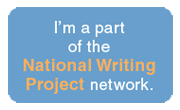Renshi is a Japanese linked poetry form. The authors link their poems by starting with words from the last line of the poet before them. Sometimes there is no particular theme, and the theme evolves as the poets link their poems, and sometimes, like this one, the poets have a particular theme or event that they are all writing about.
At the Bamboo Ridge Press
site, four poets, Christy Passion, Juliet Kono, Ann Inoshita and Jean Toyama are currently working on an online renshi around the Massie Affair. They started in August and the four will go for one year. Each poet has two weeks from the post of the author that they follow to post their new renshi.
What really excites me about this is the possibility of meaty, important writing in your non-language arts classroom. If you are familiar with some of the tools used by History Alive!, this is like Jumping into the Slide, only in writing. Basically, the students become the participants and put themselves in another's shoes as a way to fully immerse themselves in history. Check out the poems and you'll get it right away.
Historical background for this Renshi: The Massie Affair
The Massie Case is still one of the most controversial events in
Hawai'i history. On September 12, 1931, Thalia Massie, wife of Naval officer Thomas Massie, was allegedly assaulted and raped in Waikiki by five local men. The trials highlighted the delicate racial balance of the Territory of Hawai'i.
 |
| Grace Fortescue, Thalia Massie, Lieutenant Thomas Massie (Advertiser file photo) |
When a mistrial was declared and the five local men accused of the assault were set free, Lt. Massie, Thalia's mother Grace Fortescue, and two enlisted men kidnapped and murdered one of the defendants, Joseph Kahahawai. The four white defendants were represented by Clarence Darrow (of the Scopes Trial fame). They were found guilty of man-slaughter, and Territorial Governor Lawrence Judd commuted their sentences to one hour served in his company.
 |
Joseph Kahahawai (Advertiser file photo)
|
The Massies and Grace Fortescue left Hawai'i by steamship and there was never a retrial on the rape case. The young couple divorced soon after returning to the Mainland.
Thalia Massie committed suicide in Florida in 1963.
Interested now?
Go check out the
poetry as it unfolds this year.
Ann Inoshita, one of the poets also held a Renshi workshop for teachers and students, so her tips and examples are
here.

























